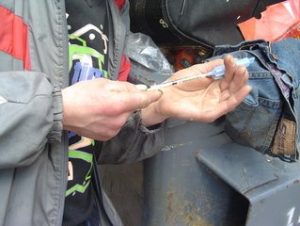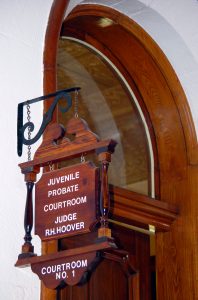 The recent wars in Iraq and Afghanistan have seen a dramatic rise in the number of mental health and substance abuse issues involving military veterans returning from serving in those wars. Some of these soldiers are returning home with mental health issues and are using drugs to deal with the mental health issues which such wars have caused. Those issues have spilled into the criminal justice system when these military veterans are getting arrested for crimes caused by substance abuse and mental health issues arising out of their military service. In an effort to address the specific needs of returning veterans, the Illinois Legislature passed legislation in 2009 establishing Veterans Courts in Illinois. The 2009 legislation did not require that counties establish such courts. Nevertheless, Cook County and Lake County did establish such courts. Veterans Courts are specific courts which are designed to steer military veterans out of the criminal punishment aspect of the court system and towards the treatment aspect of the court system. Specific courts have been established at 26th and California, Skokie, Rolling Meadows, Maywood, Bridgeview and Markham. The Veterans Courts in Cook County have been very successful and have been used as a model by court systems throughout the United States to help them establish their own Veterans Courts. The Illinois Legislature recently passed legislation requiring that each county in Illinois establish such a court by January 1, 2018. In anticipation of this new law taking effect, counties throughout Illinois are beginning to make plans to establish these courts. Kane County officials are aware of the new law and are beginning to make plans to start the process of establishing these courts.
The recent wars in Iraq and Afghanistan have seen a dramatic rise in the number of mental health and substance abuse issues involving military veterans returning from serving in those wars. Some of these soldiers are returning home with mental health issues and are using drugs to deal with the mental health issues which such wars have caused. Those issues have spilled into the criminal justice system when these military veterans are getting arrested for crimes caused by substance abuse and mental health issues arising out of their military service. In an effort to address the specific needs of returning veterans, the Illinois Legislature passed legislation in 2009 establishing Veterans Courts in Illinois. The 2009 legislation did not require that counties establish such courts. Nevertheless, Cook County and Lake County did establish such courts. Veterans Courts are specific courts which are designed to steer military veterans out of the criminal punishment aspect of the court system and towards the treatment aspect of the court system. Specific courts have been established at 26th and California, Skokie, Rolling Meadows, Maywood, Bridgeview and Markham. The Veterans Courts in Cook County have been very successful and have been used as a model by court systems throughout the United States to help them establish their own Veterans Courts. The Illinois Legislature recently passed legislation requiring that each county in Illinois establish such a court by January 1, 2018. In anticipation of this new law taking effect, counties throughout Illinois are beginning to make plans to establish these courts. Kane County officials are aware of the new law and are beginning to make plans to start the process of establishing these courts.
In order for a veteran to be eligible for Veterans Court in Cook County, enrollment has to be agreed to by the Court, Prosecutor and the Defendant. The crime that the veteran is charged with cannot be a crime of violence. The veteran will not be eligible unless they have demonstrated a willingness to undergo treatment in the program. They will also be ineligible if they have been convicted of a crime of violence within the past 10 years or if they have been discharged from a similar program within the past 3 years.
Lake County’s Veterans Court is similar with minor changes to the eligibility requirements. To be eligible for Veterans Court in Lake County the veteran must have been honorably discharged from the military, must have a service related disability or currently be in the military, must be charged with a felony or misdemeanor in which probation or supervision is available, and must be willing to participate in the program before and after they enter the program. They prefer that the veteran be eligible for VA benefits but is not a requirement. For any crime involving a crime against an individual, the victim must agree to allowing the veteran to enter such a program.
 Chicago Criminal Lawyer Blog
Chicago Criminal Lawyer Blog


 Illinois law has made a special type of Probation available for first-time felony drug offenders to avoid a felony conviction on their record. This type of Probation is commonly known as Section 410 or Section 1410 Probation. In order to be eligible for this type of Probation, you cannot have previously been convicted of, or placed on Probation or Court Supervision, for any criminal offense related to Cannabis or Illegal Drugs. This includes Prescription Drugs. If you are eligible for this type of Probation, here’s how it works:
Illinois law has made a special type of Probation available for first-time felony drug offenders to avoid a felony conviction on their record. This type of Probation is commonly known as Section 410 or Section 1410 Probation. In order to be eligible for this type of Probation, you cannot have previously been convicted of, or placed on Probation or Court Supervision, for any criminal offense related to Cannabis or Illegal Drugs. This includes Prescription Drugs. If you are eligible for this type of Probation, here’s how it works: Because of the widespread use of marijuana in our society, it is common to see criminal cases involving people who have been caught with marijuana and charged with Possession of Marijuana. While several States have legalized the recreational use of marijuana, Illinois is not one of those States. The furthest Illinois has gone to legalizing marijuana is to enact the Medical Marijuana statute which allows for the medical use of marijuana. Unless you have been approved to use Medical Marijuana, it is illegal to use and possess any amount of marijuana in Illinois. So what could happen to you if you are arrested by the police and charged with possession of marijuana?
Because of the widespread use of marijuana in our society, it is common to see criminal cases involving people who have been caught with marijuana and charged with Possession of Marijuana. While several States have legalized the recreational use of marijuana, Illinois is not one of those States. The furthest Illinois has gone to legalizing marijuana is to enact the Medical Marijuana statute which allows for the medical use of marijuana. Unless you have been approved to use Medical Marijuana, it is illegal to use and possess any amount of marijuana in Illinois. So what could happen to you if you are arrested by the police and charged with possession of marijuana? Last week, Kane County State’s Attorney, Joe McMahon, reported that Kane County Prosecutors have seen a rise in the number of criminal cases filed in Kane County in the first six months of this year compared to last year. McMahon reports that felony filings are up 15.7% compared to the same period last year. The increase in criminal cases in Kane County is happening with misdemeanor and traffic cases as well. In the first six months of 2017, 1,247 new felony cases were filed. During the same period last year, 1,078 cases were filed. Aurora, the largest city in Kane County, has seen a drop in the number of new felony cases. Most criminal cases in Kane County come from Aurora. The Village of Carpentersville has seen a rise in the number of Retail Theft cases. Carpentersville police attribute this to the opening of a new Walmart in Carpentersville. Elgin, the second largest city in Kane County, has seen a rise in violent crimes. McMahon is concerned with the increase in the number of criminal cases filed in Kane County since the number of criminal cases filed increased in 2016 as well.
Last week, Kane County State’s Attorney, Joe McMahon, reported that Kane County Prosecutors have seen a rise in the number of criminal cases filed in Kane County in the first six months of this year compared to last year. McMahon reports that felony filings are up 15.7% compared to the same period last year. The increase in criminal cases in Kane County is happening with misdemeanor and traffic cases as well. In the first six months of 2017, 1,247 new felony cases were filed. During the same period last year, 1,078 cases were filed. Aurora, the largest city in Kane County, has seen a drop in the number of new felony cases. Most criminal cases in Kane County come from Aurora. The Village of Carpentersville has seen a rise in the number of Retail Theft cases. Carpentersville police attribute this to the opening of a new Walmart in Carpentersville. Elgin, the second largest city in Kane County, has seen a rise in violent crimes. McMahon is concerned with the increase in the number of criminal cases filed in Kane County since the number of criminal cases filed increased in 2016 as well. TASC Probation is a special kind of probation that is available to criminal defendants who have substance abuse issues and elect to receive treatment for their disorder. It’s a possible sentence that I have explored throughout the years to help my clients avoid a criminal conviction and be able to move on with their lives. TASC stands for “Treatment Alternatives for Safe Communities.” This not for profit organization has offices throughout the State of Illinois in every County that provides treatment services for adults who have substance abuse issues. TASC probation is different from regular drug probation in that you do not have to be charged with a drug crime to receive TASC probation.
TASC Probation is a special kind of probation that is available to criminal defendants who have substance abuse issues and elect to receive treatment for their disorder. It’s a possible sentence that I have explored throughout the years to help my clients avoid a criminal conviction and be able to move on with their lives. TASC stands for “Treatment Alternatives for Safe Communities.” This not for profit organization has offices throughout the State of Illinois in every County that provides treatment services for adults who have substance abuse issues. TASC probation is different from regular drug probation in that you do not have to be charged with a drug crime to receive TASC probation.